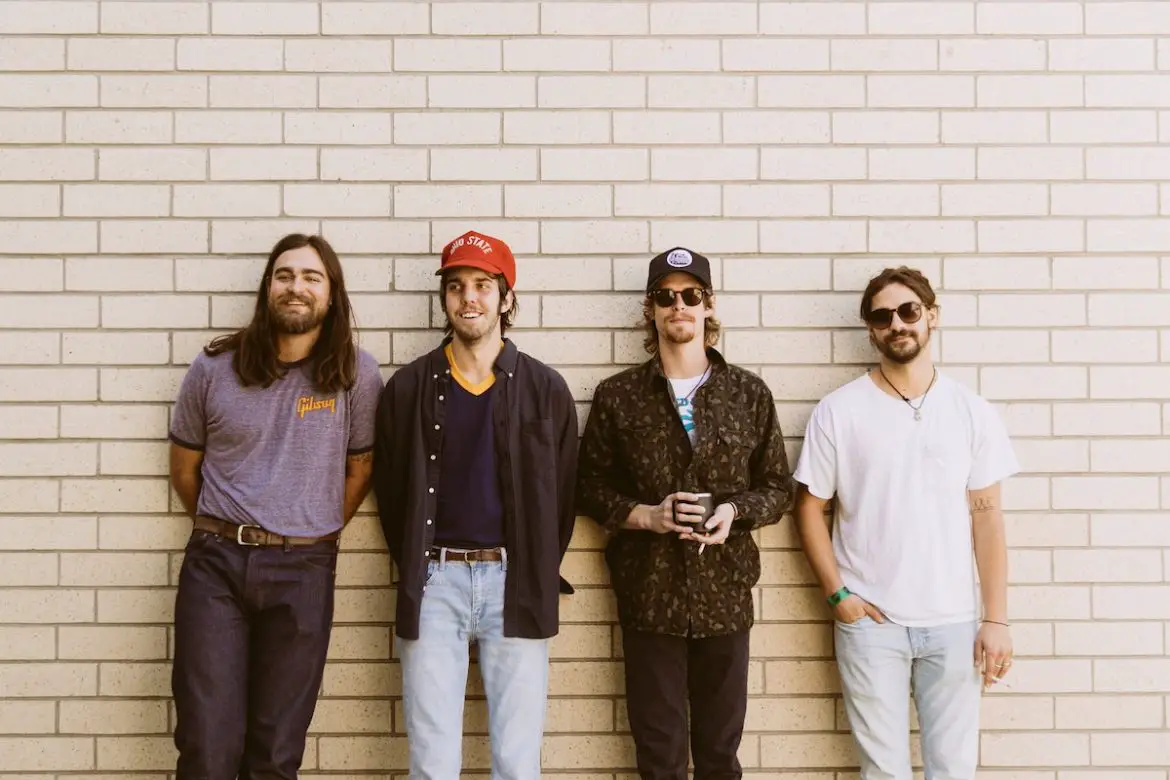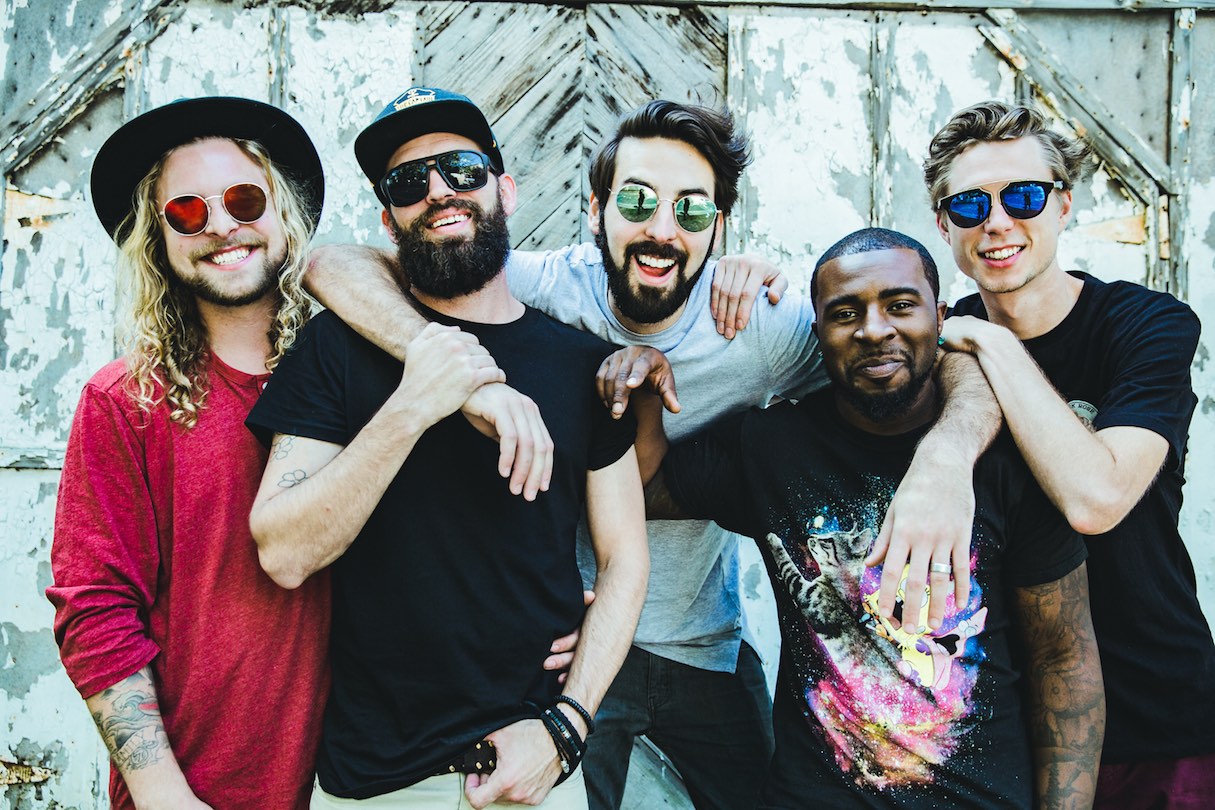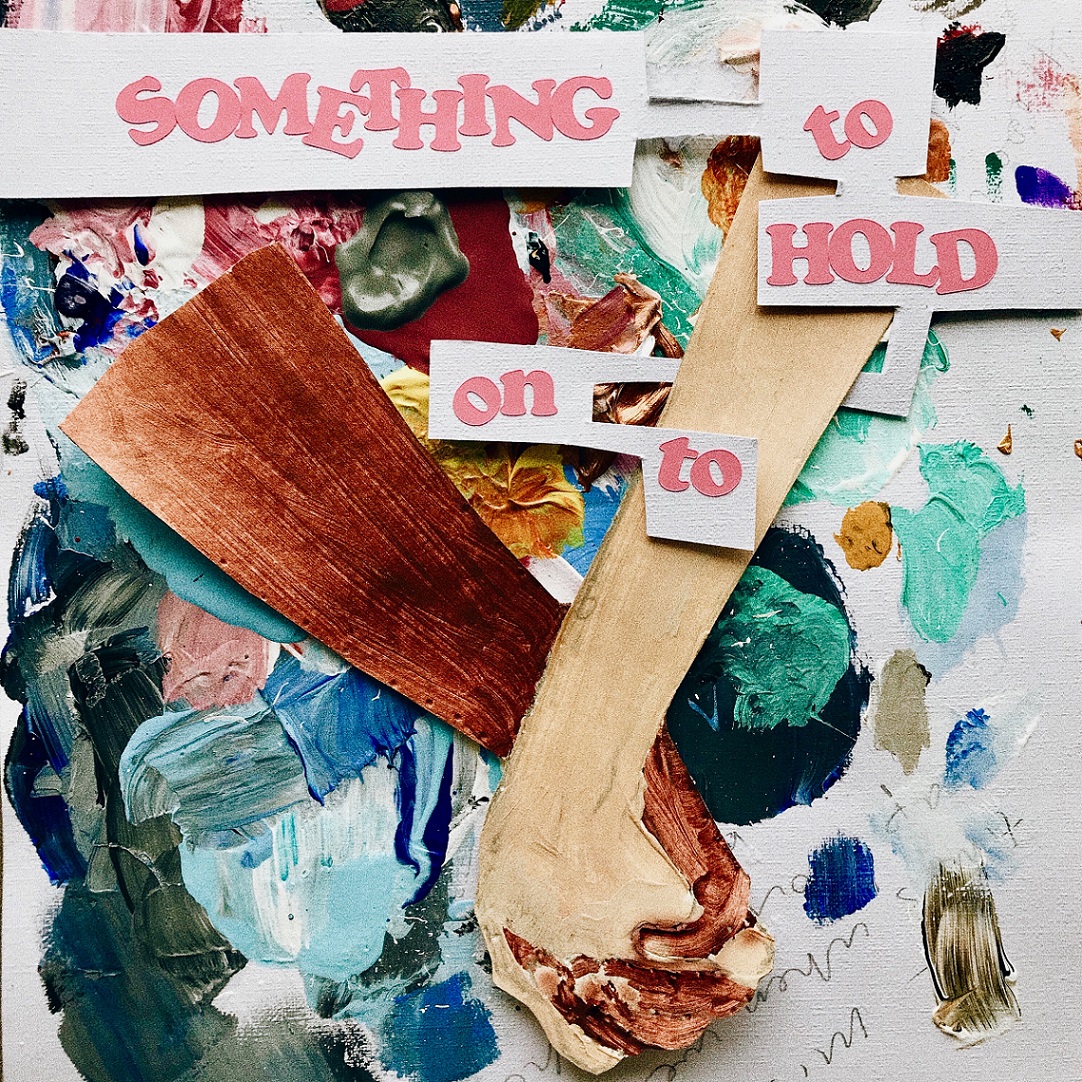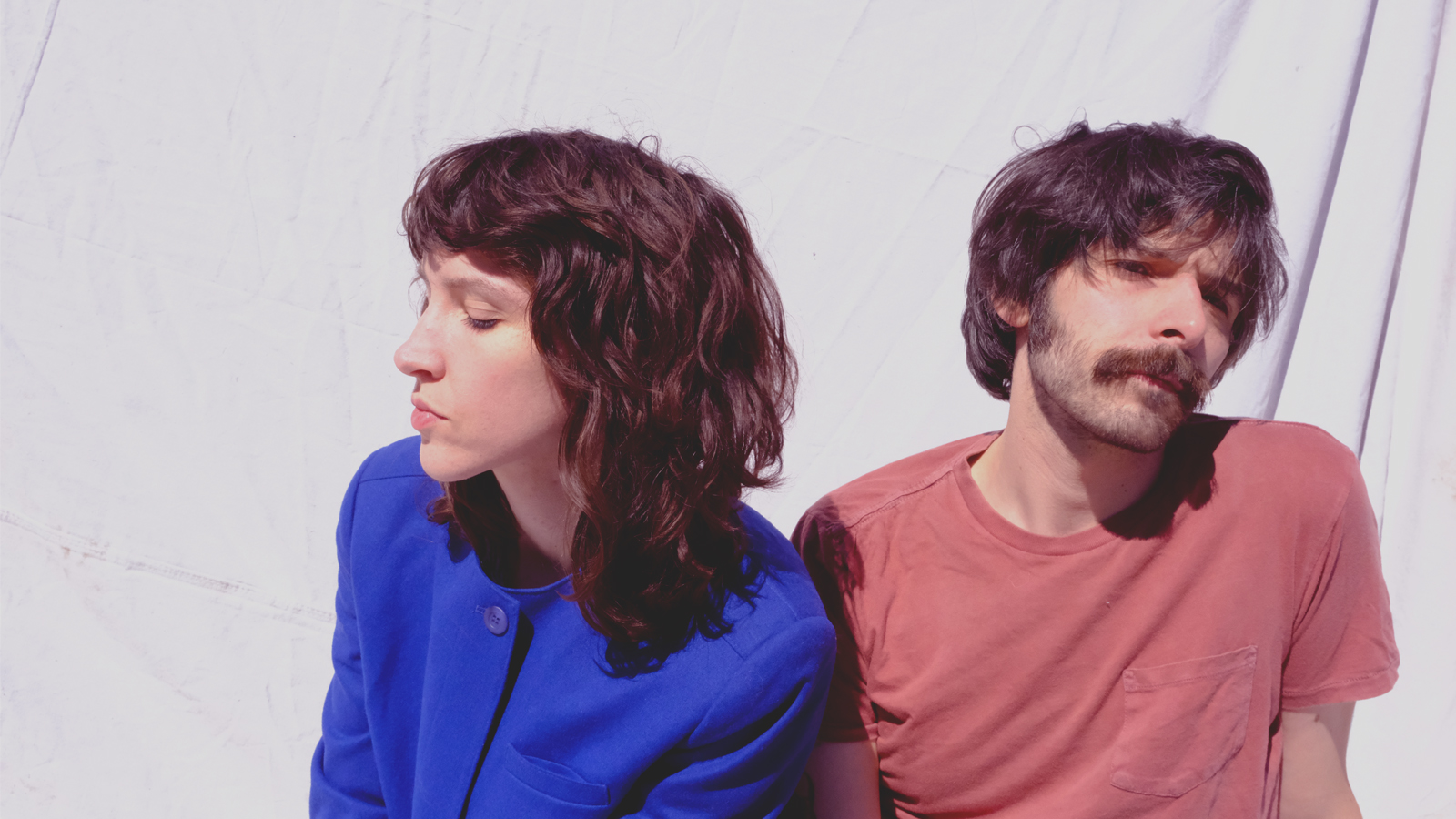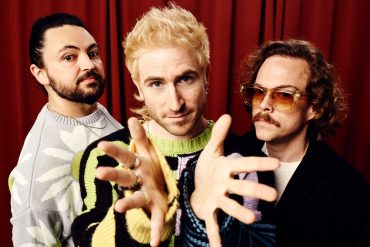Atwood Magazine chats with one of CAAMP’s founding members, Evan Westfall, to discuss the band’s evolution, approach to touring and his insightful take on the band’s debut album illuminating interesting nuances about the indie folk genre.
We have the best job in the world and when we use a set list, it makes it feel like we’re almost like we’re animals. Like it’s Seaworld and we are the whales doing tricks or something. We just like to be spontaneous; that’s just kind of how we started the band.
With over two million monthly listeners on Spotify and dedicated forever-fans who know every word to all three albums, you probably wouldn’t expect that CAAMP came to life in Athens, Ohio when two buddies, Evan Westfall and Taylor Meier, joined musical forces. It all started in high school when Westfall and Meier would burn each other CDs and cover their favorite songs together in the attic. In more recent years, CAAMP brought bass-playing Matt Vinson on board, turning the duo into a trio.
“I feel like Tay and I have good chemistry when we are both playing the guitar. It’s kind of how we started just sitting across the room from each other, both with guitars and picking around. It’s nice to go get some early day chemistry back onstage, like on some of the bigger stages where we’re playing now.”
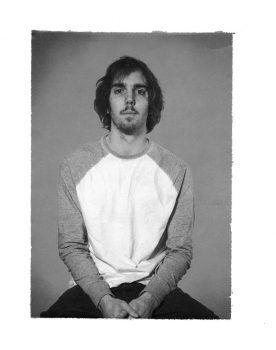
Five years ago, in 2016, CAAMP made their debut with their self-titled album and received an outpouring of praise. While they’ve also had wild success with two other records, Boys EP, Side A & B (2018) and By and By (2019), there’s something about their debut that maintains a top spot with fans and band member Evan Westfall alike.
Overwhelmingly, fans hear CAAMP’s debut album as the most quintessentially indie folk sounding record the band has put out (they’ve evolved more and more into incorporating a variety of rock influences throughout the years). “A lot of times fans will ask me,” Westfall says, “Or they’ll assume, I’m like a huge fan of Mumford and Sons or whatever and that’s where a lot of the melodies are from.” But realistically, Westfall looks back fondly on his first record and how sonically reminiscent it is of his power pop/punk high school days. Westfall hears Big Star and Tom Petty, while fans hear something closer to The Avett Brothers and Bright Eyes.
“I think it is a power pop record and it is a punk record at the same time,” Westfall elaborates, “Lyrically, it’s a lot of sticking it to the man…They’re really short, two minute hitter songs like a lot of melodic power pop/ punk songs.” The differing perspectives on the debut album begs the question: has the term ‘indie folk’ morphed into a label for non-performative and authenticity-first artistry (qualities both Westfall and his fans can agree on) and less as way to describe a genre defined by the hybridization of acoustic guitar melodies of traditional folk music with contemporary instrumentation? Is the requirement to be included less about how the artist sounds and more about who the artist is— a talent leaning more towards the subversive than towards the industry ideal?
If you buy into this orientation towards the indie folk genre, then you can agree that CAAMP is indie folk through and through. And so are all the unpolished, rough around the edges (and beautifully so) artists like Adrienne Lenker, Buck Meek, Alex G, and Fruit Bats.
If a band like The Lumineers is a photoshopped art, CAAMP is the original image. Glowing, down-to-earth souls, who you’d catch sharing a beer with their fans post-show. Sticking to their roots, the boys of CAAMP are artists not showmen, musicians not virtuosic instrumentalists, and life-long friends who have found great success in being who they’ve always been.
Read on to learn more about CAAMP’s Evan Westfall — his background, what excites him and influences him musically, and how he and the band approach touring.
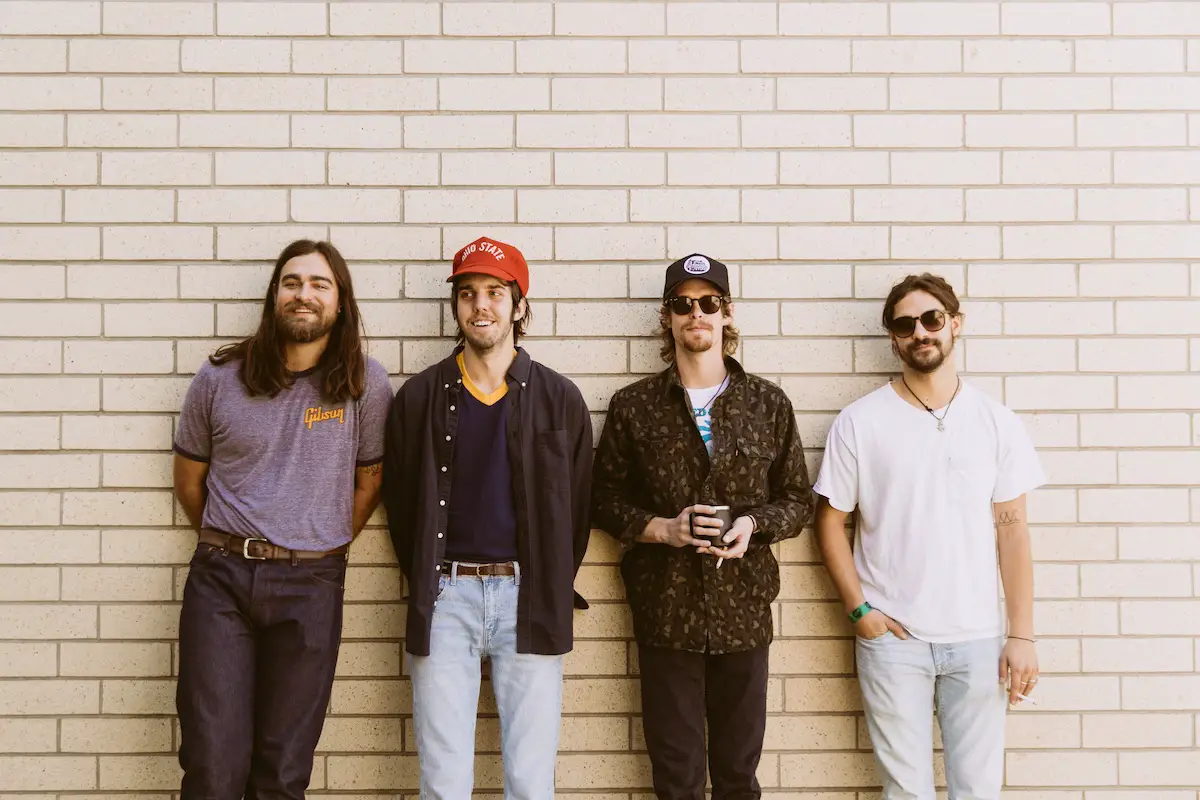
A CONVERSATION WITH EVAN WESTFALL OF CAAMP
Atwood Magazine: Could you tell me a little bit about CAAMP’s songwriting process?
Evan Westfall: Yeah. It goes all the way back to 10 years ago when Taylor and myself went to high school together in Columbus. We had just become friends. This was back when burning CDs was still a thing. I was more into rock like Tom Petty and like The Police and a power pop and punk kind of dude. Tay was more of a singer songwriter. He was into, and still is into, Ray LeMontane and artists like that. So we just shared music and then we started going to each other’s house after school and trying to just play covers.
And then we started kind of writing our own songs. Tay didn’t really play guitar at the time so I was kind of coming up with progressions and he would write words and sing over it. Then Tay started playing more guitar and would bring songs to me. So it was like that early on. Then Tay started really coming into his own as a songwriter. He would come up with a lot of really good ideas and then bring them to the band and we’d come up with our parts. We all still bring in ideas and work off each other’s ideas. Build them out that way. There’s really not one way of doing it. It’s all over the place, which is fun.
Did you guys, did you guys do music in high school at all? Like, were you in band or choir, anything like that?
Evan Westfall: No. And looking back on it, I wish I did. I played hockey growing up. I wasn’t great. I wasn’t planning on trying to make a career out of it, but I was. A lot of conditioning and just year round stuff with hockey. I just loved it so much and I still do, but I don’t play anymore, but I just, that was like what my life was in high school was sport like hockey No, we didn’t really. Like I played Viola in fourth, fifth, sixth grade, but then I quit because I wanted to play sports. I would always go to football games to watch the marching band, you know, like I wanted, like I loved the drum line. I thought that the coolest shit was when they would get the drums out. I was obsessed with that. I would, yeah, I would just watch the marching band pretty much the game would be going on at the other end and I’d be over hosting. So I wish I did that, but I did start a high school band and probably like our junior year of high school.
Did you call yourselves CAAMP back then when you started that band?
Evan Westfall: No, not yet. We had another name.
You really hopped around instrumentally in CAAMP’s earlier years ⏤ we’ve seen you play banjo, guitar, drums, percussion ⏤ and now with new members you have more hands to take over some of those instruments. What led to wanting to add more members to the band? Do you enjoy really leaning into one instrumental voice or do you miss hopping around?
Evan Westfall: Oh, that’s a great question. Thanks for asking that because I think about it actually. I take great pride in the fact that when we were in the studio for the first three albums, it was just Tay and I playin’. Just us. We’re not the best at any of our instruments. We could have studio players come in and they could make for a nice polished record, but we realized early on that people were looking for something authentic. That’s the good shit. We always just try to keep it to whoever’s in the band is playing on the record.
And then the second half of your question: one thing going into this tour was how can we make it a little bit different, change it up a little bit, play some songs that we haven’t been able to play since. I have to switch back and forth between drums and banjo or guitar. So some parts were getting left out and we just kind of wanted to grow. We thought that it would just be a nice way to gradually grow the live show, just adding our buddy to play drums with us. So I could play guitar and banjo exclusively and it’s been a lot of fun for me. I’ve been having a great time locking in to the guitar. I had never played guitar on stage with CAAMP. Guitar is my number one instrument. I feel like Tay and I have good chemistry when we are both playing the guitar. It’s kind of how we started just sitting across the room from each other, both with guitars and picking around. It’s nice to go get some early day chemistry back onstage, like some of the bigger stages where we’re playing now.
That's actually really cool because it's like a piece of your beginning, but it's also the evolution of CAAMP at the same time.
Evan Westfall: Yeah, exactly.
How do you guys pick a set list?
Evan Westfall: We don’t use a set list. We never have. We’ve tried it before but it just always feels stale when we’re all anticipating the next song or looking down at the songs we’ve already played and you’re just staring at a sheet of paper. We’ve been poked into doing it a couple of times, just to help the flow of the live. But whenever we’ve done it, it just really hasn’t felt right. We have the best job in the world and when we use a set list, it makes it feel like we’re almost like we’re animals. Like it’s Seaworld and we are the whales doing tricks or something. We just like to be spontaneous. And that’s just kind of how we started the band, like playing house shows and open mics where it was just a free for all. You never know what you’re going to get really. Tay is a really good front man, but we’re not like showmen. We’re not going to be the ones out in the crowd with our instruments, getting people to clap their hands and stuff. Like, that’s just never been our thing. So it just kind of, it kind of seems to work for us. Just the house show vibe, I guess, at some of these bigger shows. Yeah, it seems to be going all right. You know, if it ain’t broke…
Don't fix it.
Evan Westfall: Yep.
What contributes to the growth of CAAMP’s sound? And are there any particular moments from recording any of the past three albums that really stand out to you as representing a moment of that evolution or of that change?
Evan Westfall: That’s a great question as well. Seriously. We all are of course music lovers. We’re always listening to music on the road and wherever. So that definitely plays a big part in what comes next on our records and stuff. Whatever we think sounds cool we are going to try to do it and make it our own. It’s not just like we all just only listen to Bob Dylan or whatever. We all have our own different tastes and we all enjoy different genres. And I think that that definitely factors into the way the records come out. A lot of times fans will ask me, or they’ll assume, I’m like a huge fan of Mumford and Sons or whatever and that’s where a lot of the melodies are from. But no, a lot of these melodies are like power pop or like the Ramones or The Clash. You know we pull from different genres and I think that’s what makes us unique in a way.
What do you think high school Evan’s favorite album you guys have made would have been?
Evan Westfall: The first album. I haven’t told anybody this yet, but I think it is a power pop record and it is a punk record at the same time. Cause lyrically, it’s a lot of sticking it to the man. You know, fuck you, if you don’t like what I’m doing, I’m going to do it anyway, kind of mentality throughout the whole album. Also they’re really short, two minute hitter songs like melodic power pop/ punk songs. I always look back at that album with really fond memories, like writing and recording it and just everyone’s words about it. And when people talk to us about what the first album means to them. There’s nothing like recording and writing your very first album. Like usually when it’s your first album you’re naive and you’re young. You have no idea what’s going to happen after that. And you just kind of roll into it blind.
Could you name some things that if someone was to mention them to you, your response would be, “Oh, that's so Ohio?”
Evan Westfall: Yeah, saying “Ope!” and Bob Evans— it’s a restaurant that looks like a red barn.
What are you inspired by that isn't necessarily music or other musicians or Ohio?
Evan Westfall: For me personally, the feeling of nostalgia. A lot of the music that I am drawn to has melodies that make me feel nostalgic. I love instrumental music and I love a good lyrical melody line. Or like guitarline and stuff like that. Whenever I hear a really pretty instrumental I start feeling those emotions, that is probably what inspires me the most. Or just like a songwriter that sings kind of how they speak, you know, like someone who’s not trying too hard to sing, but just doesn’t have to be by some people’s standards, like a good voice. Like I like the kind of struggling voice singers that kind of just have their own way of talking slash writing lyrics. That really inspires me lyrically.
Like a Kris Kristofferson type of vocal?
Evan Westfall: Yeah. Oh, but you said, you said music that’s not music though.
You know, there are no rules here.
Evan Westfall: I have an answer to that though, too. Actually, you brought it up. The first thing you said to me was that one of your friends was talking to me at a bar post-show and it’s just that, meeting new people. Yeah. Meeting people like that and touring, and just being in a different city every day. And especially when we were in the van, when we were like awake for the drives of, so we could look out the window and see everything. Just kinda sit there in your own thoughts. That was super inspiring. I’d always get home from a tour and a bunch of random ideas would come out over the next couple of days after getting home, just from meeting new folks and experiencing new things.
— —
— — — —

Connect to CAAMP on
Facebook, Twitter, Instagram
Discover new music on Atwood Magazine
? © 2021
:: Stream CAAMP ::

